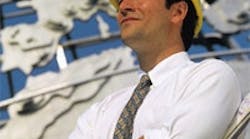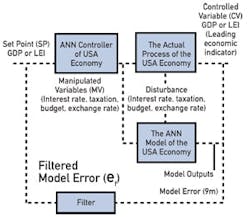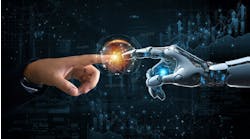"Ask the Experts" is moderated by Béla Lipták, editor of the three-volume Instrument Engineer's Handbook (IEH). While the publication of the 5th edition is years away, I am recruiting co-authors who will bring fresh blood and increase the global nature of the handbook. I welcome contribution offers from qualified colleagues. Submit questions to [email protected].
Q: In 2005, Béla Lipták wrote an article describing how one might design a control system for the global economy as if it were an industrial process. ("Can an Automation Engineer Control the Economy?" Lessons Learned, Sept./Nov. 2005, www.controlglobal.com/articles/2005/479 and www.controlglobal.com/articles/2005/530.html). Has he done any more work in this area in the past five years?
Dr. David Scott III
[email protected]
A: Yes, all processes, including the economy, are controllable, but that does not mean they will be controlled. The prediction of my 2005 article unfortunately turned out to be fairly accurate, as the housing bubble did burst, showing that the laws of process control apply to all processes. Now, five years later, I believe that if the "control loop" is not corrected, in a couple of decades the whole global economy can become an uncontrollable runaway process. But, I also believe that this unstable process can be stabilized, if the recommendations of artificial neural network (ANN) algorithms are followed.
ANN can control processes we do not fully understand, if the behavior of the process is rational and predictable by "self-tuning." ANN is capable of learning the "personality" of any predictable process on the basis of its past performance, and determining its dynamics by observing its "dead time," "gain," "period of oscillation," etc. The key word here is "predictable," meaning that the future behavior of the process is predictable on the basis of its past behavior.
In case of the economy, this predictability itself is changing. For example, in the past, the period of its oscillation equaled about five dead times, but due to faster communications, its dead time is getting shorter. And, because of the general nervousness, its gain (sensitivity) is also increasing.
It is possible that the next cycle of oscillation of the unstable and runaway global economy might create an even worse upset than did the "housing bubble." This upset is likely to occur because our controller (the government) did not obey and implement the control algorithm shown in Figure 1. Why? Because the strategy of keeping the controlled variables (GDP, LEI, unemployment and debt) "on setpoint" by manipulating the flow of money into the economic process (by throttling taxation, expenditures, trade barriers, interest and exchange rates) was not implemented.
In a few decades, the ANN algorithm of Figure 1 will no longer be applicable because major new disturbance variables are evolving. These disturbances have both long dead times and large inertia, which tend to make control very difficult. Using process control language, these new disturbances are reset windup, loop interactions and limit control.
Reset wind-up occurs when the integral mode of the loop keeps integrating the area under the error curve while the controller output is prevented from correcting the error. This occurs when the loop is in manual, or when the control valve is already fully open. In case of the economy, this occurs when the "controller" increases the flow of money into the economy "in the manual mode" (without balancing it). This causes reset windup (the accumulation of error = debt). Under this manual control, interest rates are kept artificially low, and expenditures can be increased without increasing taxes. Eventually reset wind-up causes the loss of control. In the case of the economic process, the loss of control can result in the burst of the "debt bubble" and a major depression.
Interactions between control loops occur when the control actions of one loop upset another. This is how national economies operate today because they are not "cascaded" to (are not controlled by) a common master controller. This interaction is already occurring as the mostly open-loop, feed-forward totalitarian economies, such as China, interact with the mostly free-market based economies of the United States or the European Union that are under closed-loop (free-market based) feedback control.
The third, and probably the most important, new development is that the process itself is changing because the global economy is beginning to exceed its limits on resource availability because the rate of growth in consumption has already exceeded the rate of new resource discoveries. This changes the continuous control algorithm of the past, when pumping more money into the economy fueled economic expansion (assumed in Figure 1) into a constraint-limited process. As a result, the introduction of more money can no longer increase resource availability. If we continue to increase the use of exhaustible resources, the process will change into a batch process in the sense that once the supply is gone, it has to stop. The process of the economy can also be compared to an industrial process where the cooling water control valve has reached full opening. Once that occurs, cooling can't be increased, control is lost, and an explosion can be the result.
Figure 1. The structure of the control algorithm for the U.S. economy used to be as shown.
Consequently, if we don't want the process of the global economy to become a batch one, the conversion to a steady-state control strategy is essential. A steady-state control model differs from Figure 1 because the manipulated variables themselves have to change. In other words, when the goal is stable and continuous operation, the algorithm must stabilize the population, convert to the recycling of resources and to the use of inexhaustible and free energy sources.Béla Lipták
Q: Adapting the Control Model of the Economy
I would like to urge you to write down your thoughts on the economy rather earlier than later.I wish you'd be involved as a direct advisor to the President.
The sad reality is that here in North America not many engineers get into politics, compared to the European Union or Asia, and the heavy load of lawyers, as smart as they might be, don't sometimes do not understand the basic science that comes from an engineering education.
I often thought of the economy as a process. That's why I like following your writings on this subject.
Emanuel Bocancea, M.Sc., P.Eng.
CPC Canadian Operations Optimization
A: Recently, I have tried to consider the nonlinear nature of the process (the cultural and emotional characteristics of society) that tends to result in different responses to the same manipulation. I have also tried to consider the time constants (the time it takes for us to accept new ideas), the cultural dead times of individuals (once an individual formulates his or her views, change is unlikely until the next generation), and the gains (speed of response) of the human component of this control loop. I also considered the "batch time" (the time remaining until global demand exceeds the availability of resources) and compared this time to the time we have to stabilize the global economy by implementing a new multivariable envelope control algorithm.
To convert from the present runaway batch process to a continuous (stabilized) one requires the elimination of the "interactions" among the 200 control loops of individual nations and the acceptance of a cascade master controller that will "herd" the setpoints of all 200 nations during the transition from the present, unsustainable (batch) global economy into a stable and sustainable one. This process—the gradual evolution of a global government of sorts—is likely to be slower and even more difficult than the formation of nation-states Yet it is needed, and the algorithm suggests that the most time we have to do it is one century.
On one hand, controlling the global economy is no more difficult than controlling a slow, nonlinear, large-inertia and interactive industrial process. On the other hand, it is next to impossible because the manipulated variable (human behavior) is unpredictable and not always rational. Consequently, it is likely that the 200 slave controllers will not accept the setpoint from a global cascade master controller (even if it ever evolves) and will end up fighting each other over scarce resources.
Direct ANN control of the global economy can't be implemented until mankind understands and accepts the relationships between its actions and their consequences, and that may take generations. However, developing such a control algorithm is still desirable because it will show what will happen if we do not change.
Process control theory based on reliable ANN analysis clearly proves that the global economy can self-destruct if by the end of this century, an effective global institution (cascade master) is not allowed to evolve to control it. Today, we are only at the very beginning of this evolution, for two reasons: 1) because many nation states are unwilling to subordinate their interests to that of mankind; and 2) because most people do not yet understand that a gradual transition to a sustainable lifestyle is not an option, but a must.
As such, we live in a dangerous age, because while both our economy and our communications are already globalized, neither is controlled because today the 200 nation-states are unwilling to subordinate their interests to global prerogatives. For these reasons, the ANN shown in Figure 1 is insufficient to control the economy.
I am preparing a new chapter for the next edition of the Instrument Engineer's Handbook dealing with the control of non-industrial processes. There I will publish a revised version of Figure 1. I hope that this algorithm will be able to control the transition from our present economy to a sustainable one.
My blunt language is not meant to fuel resignation and pessimism! Not at all! I am optimistic that the accumulated knowledge of process control professionals will make a great contribution to convert mankind's culture of unlimited growth to a stable one.
Béla Lipták
A: When I was a young engineer in the sixties (and engineering was a respected profession), I preferred dealing with machines to dealing with people. I could predict the behavior of a machine if I knew how it worked and could quantify its limitations, so I could get the machine to do what I wanted. I had no such understanding of people. Indeed, irrational behavior seems to be the norm and not the exception.
Therefore, I wonder how the economic loops might be closed. Suppose the growing scarcity of resources like oil, water, etc. could be controlled by reducing the number of people on the planet, but no politician or religious leader will call for population control, although the Chinese tried. So here is a loop that can't be closed.
The few people that have hoarded most of the money control most of the planet. As Amy Chua said in World on Fire, free markets allow a few people to buy up the markets, and democracy allows the best politicians to be bought by supporting their re-elections. There will be no scheme to control, never mind reduce, the population, because the hoarders depend on growth to fuel their need for more. Suppose algorithms showed that trading derivatives, credit default swaps, etc. are a great danger to the economy, and that what is needed is to downsize the traders and eliminate all of the laws that their purchased politicians have made to allow them to steal from the little people. What kind of actuator could do that?
Or suppose that an economic control algorithm determines that the cause of a high domestic unemployment is that corporations that create jobs now look outside our economy, forgetting the lessons of Henry Ford, who paid his workers enough so that they could buy his products. What could possibly bring that measurement back under control?
My wife, who listened to my brief description of a control loop in this context, decided that the actuator actualizes results. What good is it to solve the control algorithms if there is no way to actualize the means to move people?
Please tell me that you have some answers to these questions.
Bill Hawkins
[email protected]

Leaders relevant to this article:




